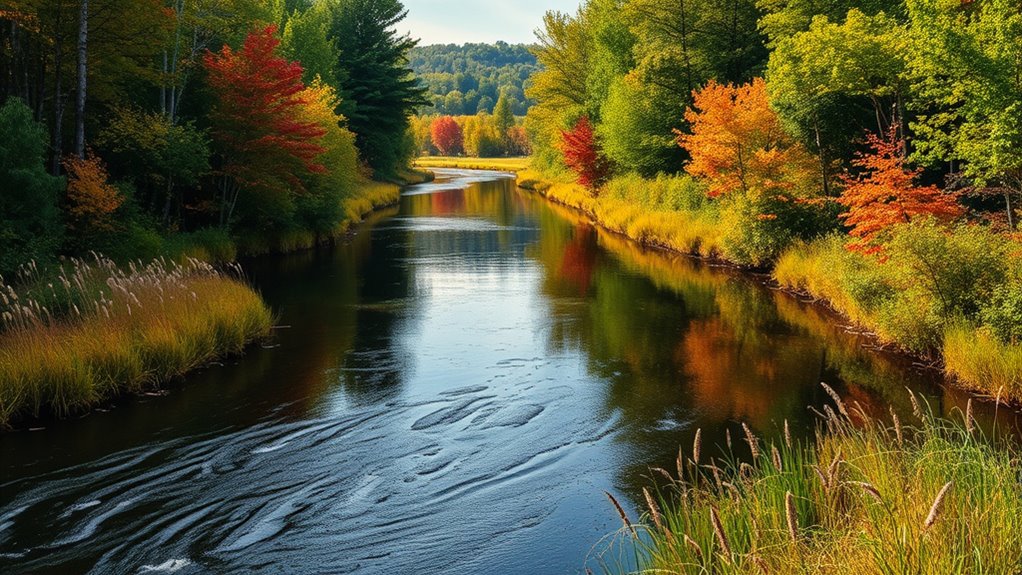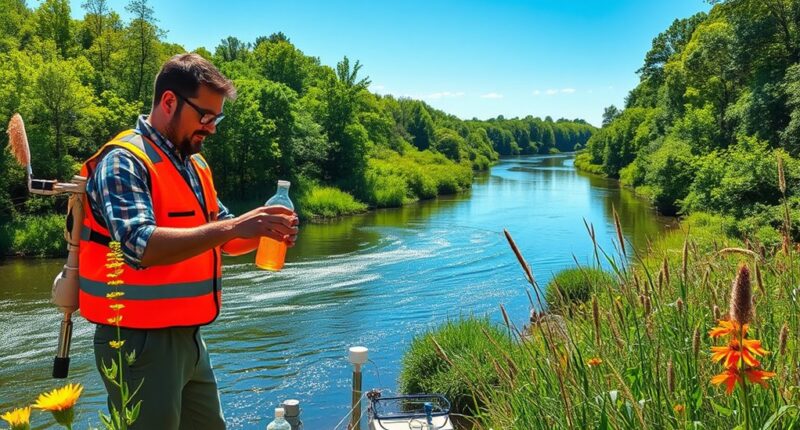Protecting Missouri’s waterways involves addressing pollution from industrial runoff, agricultural practices, and weak regulations. You can support efforts like promoting sustainable farming, advocating for stricter enforcement, and increasing community awareness. Implementing best management practices and riparian buffers can reduce runoff, while upgrading wastewater treatment helps cut contaminants. Staying informed and involved makes a difference, so if you want to learn more about how to make an impact, keep exploring options to safeguard water quality in Missouri.
Key Takeaways
- Industrial and agricultural runoff introduce harmful chemicals, heavy metals, and nutrients into Missouri waterways.
- Excess nutrients from runoff cause algae blooms and oxygen depletion, creating dead zones harming aquatic life.
- Enforcement of pollution regulations and adoption of sustainable practices are essential to reduce water contamination.
- Riparian buffers and best management practices help filter pollutants before reaching water bodies.
- Community involvement and advocacy are vital for strengthening policies and promoting water conservation efforts.

Ever wondered about the state of your water in Missouri? It’s a valid concern, especially given the complex challenges the state faces in maintaining water quality. Pollution from various sources, particularly industrial runoff and agricultural practices, markedly impacts the health of Missouri’s waterways. Industrial runoff, which includes chemicals and waste from factories and manufacturing plants, often finds its way into rivers and lakes. These pollutants can contain heavy metals, toxic chemicals, and other hazardous substances that threaten aquatic life and pose risks to human health. When these contaminants enter water systems, they can accumulate over time, making water unsafe for drinking, recreation, and wildlife. Combating industrial runoff requires persistent oversight and stricter regulations on industrial discharges, but enforcement can be inconsistent, leaving waterways vulnerable.
Industrial runoff pollutes Missouri’s waters, threatening health and wildlife, requiring stricter regulations and ongoing oversight.
Agricultural practices also play a major role in water quality issues across Missouri. Farmers often rely on fertilizers, pesticides, and herbicides to boost crop yields, but these chemicals don’t stay put. Instead, they wash off fields during rainstorms and seep into groundwater or flow directly into streams and rivers. This runoff can lead to nutrient pollution, causing excessive algae growth that depletes oxygen in the water, creating dead zones where aquatic life cannot survive. Livestock operations contribute further, with manure and waste products sometimes contaminating water sources if not managed properly. These practices, while essential for local economies, need to be balanced with sustainable approaches that minimize environmental impact. Additionally, implementing best management practices can significantly reduce the amount of pollutants reaching water bodies.
The challenge lies in finding solutions that both support Missouri’s agricultural and industrial sectors and protect its water resources. It’s essential for communities to advocate for stronger policies, better enforcement, and innovative practices that reduce pollutants entering water systems. Simple steps like riparian buffers—strips of vegetation along waterways—can markedly filter runoff before it reaches the water. Upgrading wastewater treatment facilities and encouraging farmers to adopt best management practices can also make a difference. Public awareness and community involvement are vital; when residents understand how their actions influence water quality, they’re more likely to support conservation efforts.
Ultimately, safeguarding Missouri’s water is a shared responsibility. By addressing industrial runoff and reforming agricultural practices, you help preserve the state’s natural beauty and ensure safe, clean water for generations to come. Every effort counts, whether it’s advocating for stricter regulations, supporting sustainable farming, or simply being mindful of how you use water in your daily life. Missouri’s waterways depend on it, and your actions can be a powerful part of the solution.
Frequently Asked Questions
How Does Climate Change Impact Missouri’s Water Quality?
Climate impact raises water temperatures in Missouri, which can harm aquatic life and promote algae growth. As water gets warmer, oxygen levels decrease, making it harder for fish and other species to survive. You’ll notice more frequent algae blooms and reduced water quality, which affects recreation and drinking water sources. Addressing climate change is essential for maintaining healthy water systems and protecting Missouri’s environment for future generations.
What Role Do Citizens Play in Water Quality Protection?
You play a crucial role in water quality protection through community engagement and pollution prevention. By staying informed, participating in local clean-up efforts, and advocating for pollution controls, you help reduce contaminants entering water sources. Your actions, like proper waste disposal and conserving water, directly impact water health. When communities unite, they create a strong front against pollution, ensuring clean water for everyone and safeguarding Missouri’s precious water resources.
Are There Upcoming Policies to Improve Missouri’s Water Standards?
Your state’s policymakers are actively working on policy updates and legislative initiatives to boost Missouri’s water standards. These efforts aim to tackle pollution head-on, transforming Missouri’s waterways into pristine, life-giving arteries. You can stay informed about upcoming rules and reforms that could considerably improve water quality. By supporting these initiatives, you help create a cleaner, healthier environment for everyone, ensuring Missouri’s waters remain vibrant and essential for generations to come.
How Does Agricultural Runoff Affect Local Water Bodies?
Agricultural runoff considerably impacts local water bodies by carrying fertilizer contamination and soil erosion into streams and lakes. When you use excess fertilizers, nutrients like nitrogen and phosphorus wash into water sources, causing algae blooms and harming aquatic life. Soil erosion from fields further pollutes water with sediment, reducing clarity and oxygen levels. To protect your water, adopting best practices like buffer strips and responsible fertilizer use is essential.
What Technologies Are Used to Monitor Water Pollution Levels?
You can use remote sensing and biosensors to monitor water pollution levels effectively. Remote sensing involves satellites or drones capturing images and data from above, helping you identify pollution hotspots quickly. Biosensors are portable devices that detect specific contaminants in real-time, providing immediate results. Together, these technologies give you a thorough view of water quality, enabling timely interventions and better management of pollution sources.
Conclusion
You might think protecting water quality is too overwhelming or costly, but every effort counts. By staying informed and supporting local initiatives, you can make a difference in Missouri’s fight against pollution. Remember, small actions like reducing runoff or advocating for cleaner practices directly impact your community’s health. Together, we can safeguard Missouri’s water for future generations. Don’t wait—your involvement is vital to keeping our water safe and clean.









